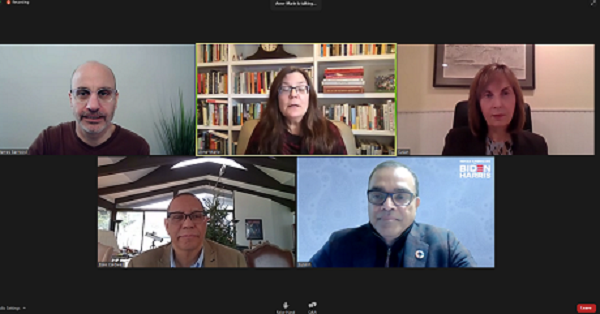NJ University Entrepreneurship Leaders Give Business Guidance during Downturn
A panel of New Jersey university entrepreneurship leaders gave advice to startups and small businesses on how to survive the challenges brought on by the pandemic. The group was brought together on January 8 by James Barrood, former president and CEO of the New Jersey Tech Council (New Brunswick) and now an adviser to Tech Council Ventures (Summit).
But, first, several of the university entrepreneurship experts reflected on where entrepreneurship stands today.
While there is a lot of hurt out there, digital businesses seem to have overcome the issues that arose during the pandemic, said Susan Scherreik, director of the Center for Entrepreneurial Studies, at Seton Hall University’s Stillman School of Business.
It’s a bifurcated space. “We know that 30 percent of small businesses have closed in New Jersey,” she said. But there are some very bright spots. “We have two young alumni, one runs a retail specialty online operation in Hoboken, and they’re the 17th-fastest growing business in New Jersey. Another one of our alums runs a medical digital operation, and they’re the eighth-fastest growing business in New Jersey.”
Princeton University’s Anne-Marie Maman, executive director of the Princeton Entrepreneurship Council, who works with companies in need of venture capital, said “It’s gotten harder and harder” to get venture capital. “By the time an entrepreneur gets to a fundable VC round, those rounds are huge.” Compared with before, a venture capital round used to be between $3 million and $5 million. “Now we’re seeing rounds of $100 million. And you have a lot of fundable milestones to hit before you get funding.”
Speaking about family businesses, Dale Caldwell, executive director of Fairleigh Dickenson University’s Rothman Institute of Innovation and Entrepreneurship, noted that they have been disproportionately affected by the pandemic. He urged the audience to remember that when a family business closes, the entire family is often unemployed. By contrast, a lot of the big box stores have stayed open and are doing record business.
Caldwell would like to see a pandemic equity grant for family businesses. “They should really grant some of that money to local family businesses, since it affects them much more than the rest.” Another idea is to create entrepreneur zones, built around the idea of an opportunity zone, “but the idea is to provide tax credits to people to invest in businesses in urban communities.”
How Businesses Survive During the Pandemic
Suresh Kumar, director of innovation and entrepreneurship programs at NJIT’s Ying Wu College of Computing, noted that the first thing entrepreneurs must do is reevaluate their business models and “get a bearing of where they are. Can they still sell what they have been selling before” during the pandemic? They also must review their distribution partners and business models, and look at their office space requirements.
He added that many entrepreneurs don’t know how to use digital strategies for marketing. There are lots of layers to digital marketing, he said, and entrepreneurs must understand how to grow social media to bring in customers. “You need a few key people in the company who really understand how to use social media” in this way, he said.
Kumar said that, at this stage, 10 months into the pandemic, companies should concentrate on getting customers and retaining customers. They have to do “whatever it takes” to deliver value, and “maybe you deliver a little bit more and focus on that aspect. You might be able to deliver more service or provide a different channel of delivery.
He said that to get customer betas done, you may have to create new structures, perhaps giving some equity to your customer partner for assuming the risk.
Caldwell said that family businesses that have been plodding along for 100 years should probably send their executives back to school to take courses, to bring those running the business up to date.
Also, many family businesses were left behind when disaster struck in 2020 because they hadn’t cultivated relationships with their bankers and accountants. “You really have to build these relationships,” including with your landlord, he added.
“The piece of advice that we give most often is to tap into your network,” Maman said. “Now is the time that it’s important to think about who you know that can help you, whether that’s helping you with an introduction to a customer, whether that’s helping you think through strategy; giving you advice from somebody who’s been there, done that before; whether it’s giving you an introduction to a banker or a lawyer; whether it’s connecting you to somebody else. Maybe they can’t [help you], but maybe they know somebody else that can. So, if you haven’t been doing this before, start tapping into that network as hard as you can.”
Another important piece of advice is that entrepreneurs must go back to basics, Maman said. “I think for a while it was easier to float along without having everything buckled down,” and without really understanding your strategy and your finances, and there’s no room for that anymore. “You really must do your work on your basic foundation if you’re going to be going out and answering questions about your business.”
Scherreik agreed with the other panelists on social media. She noted that keeping a company’s name in the public eye, in a good way, will help it to recover when things begin to get back to normal. For example, one entrepreneur has been delivering pizzas to essential workers, and while his company may be hurting, he is keeping the name top of mind for when the pandemic ends.
Now, more than ever, entrepreneurs are focused on day-to-day survival, she added, but they must take a step back and spend time on long-term planning. They need to look at their financial health and see how their income statements, balance sheets and cash flow statements look compared with a year ago.
Things are not going to be the same after 2020, she said, so “make sure you are in tune with your customers,” and know what they want from you going forward.
Best Tips
Before the session ended, the experts gave their best tips to the entrepreneurs on the call.
- Maman: “The thing I always come back to for myself, as well as for people that I’m talking to, is ‘first things first,’” referring to getting back to business basics. “You must make sure to do the first things and do them well before you can grow to do other things.”
- Caldwell: “Understand that you don’t know everything, no matter how long you’ve been in business. Be hungry for learning, because I will guarantee there’s something on the internet, something,” maybe that’s just on YouTube, “that is going to make you 10,000 more dollars that you would have made over the next month. I’ll guarantee that, but you’ve got to find it.”
- Scherreik: “Put your employees first.” Entrepreneurs and small business owners may be struggling, “but we’re all going through this pandemic, and there’s a huge illness out there. Check in with your employees, make sure they’re okay, make sure their families are okay.” Let them know that it’s no problem “if they need more flexibility in their schedules, whatever it might be. Don’t forget that human element. They are your lifeblood, and they are people, and we all have to stick together to get through this.”
- Kumar: “Three out of 1,000 people are entrepreneurs.” You must figure out how you are dealing with the rest of the 997 people. “The other 997 people will determine your success. They can be customers, investors, suppliers, brand champions, partners, mentors.” Entrepreneurs have to “build what I call ‘high-trust relationships,’ and that would not happen only online … it’s got to be done in other ways, too. And I think you’ve got to focus on how you do that. There’s a community out there … and if you can engage them constructively, you have a much better chance of succeeding.”
A video of the panel discussion can be found on YouTube here.




